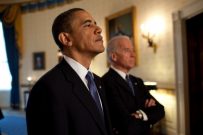Virtual Democracy: An Institutional Plague
Over the weekend, Jonathan Turley opined at The Hill that the coronavirus pandemic necessitates the adoption of “virtual democracy.” The virus has already put Supreme Court arguments on hold, and it threatens to upend Congress’ schedule as well. As such, he argues, the government ought to embrace the tools that would allow those institutions to operate remotely.
While his argument begins with the coronavirus crisis, there is more than a little hint of “not letting a crisis go to waste,” as he eventually argues that permanent changes, such as televised Supreme Court arguments, ought to be adopted. He further claims that there are no good arguments against virtual government aside from knee-jerk opposition to anything new, and that the constitution’s framers, many of whom were enamored with technological developments, would have approved. The present crisis may necessitate some extremely limited exceptions to our in-person government, but there are very good arguments against the innovations he proposes, and it is in no way clear that the founders would have approved of them.
Some founders may have been interested in new technological developments, but this in no way indicates that they would approve of virtual government. They approached constitutionalism with a little more subtlety than a simple “new versus old” binary. The founders considered how the operation of institutions might either exacerbate or ameliorate the corrupting tendencies in popular governments. Remote voting and a more “transparent” Court would likely lead in directions they explicitly sought to avoid.
Most founders—James Madison at least—envisioned a legislature in which all the major divergent views in the country could be represented by the most talented statesmen who would then engage in genuine deliberation leading to national-minded compromise. Given natural human selfishness, not to mention electoral incentives, this national-minded deliberation isn’t easy to create. As Madison noted in several Federalist essays, the parameters of the legislature—its size, its term length, the qualifications of its members—were carefully designed to create an environment in which this deliberation could take place.
As Phillip Wallach recently noted, remote voting threatens to turn representatives into simple mouthpieces, capable of expressing the unfiltered views of their constituents, but largely incapable of genuine deliberation. This turns the role of the legislature into simple “preference aggregation.” Real, person-to-person discussions can force representatives to put aside the intractable partisanship that is so easy to adopt from hundreds of miles away and work with other flesh-and-blood humans to solve problems. Congress was intended to be a whole that is greater than the sum of its parts, not simply a vote-collecting body that could work just as well on an app.
To be fair, Turley suggests such distance technology should only be used “in an emergency.” But once it is normalized for national emergencies, it is hard to imagine that it would not be permitted for personal emergencies and that members would not warm to its use on a more regular basis.
Ultimately, the push to digitize government in this crisis boils down to a false sense that if public officials aren’t going about their normal routine our political system is failing.
Moreover, such emergency situations are often the ones that require in-person communication the most. The massive, time-sensitive coronavirus stimulus package, for instance, has had to overcome significant partisan differences, not to mention some brazen attempts to hijack it. Breakthrough in the Senate came only after two straight days of late-night, face-to-face meetings, in Minority Leader Chuck Schumer’s office on Monday, and in Majority Leader Mitch McConnell’s office on Tuesday. Imagine a similar situation when members of Congress are all in their home districts. Does anyone really think such negotiation would be as effective over a conference call?
Televising Supreme Court proceedings is an even worse idea. The judicial branch is the only branch for which rigorous argument is still the business of the day. It is the only branch that has not primarily become a platform used by its members to advance their personal ambitions. The justices themselves rarely say or do anything in oral argument designed to seek the spotlight. Strategic comments are generally geared toward influencing one another, rather than the public. Even their jokes tend to have genuine argumentative purposes. Television cameras would threaten all of this by making the Court’s daily activity source material for our watered-down “infotainment” industry and angry Twitter partisans.
Pivotal Supreme Court decisions already generate considerable public controversy and partisan division. Now imagine that they all come with dramatic, televised showdowns in which the justices would have an opportunity to showcase their position and potentially influence news coverage of the case. As it is, in certain high-profile cases, justices sometimes include more quotable, emotive language in their opinions designed for public consumption. It is not unreasonable to think that this tendency may be indulged even more in televised arguments if they knew meme-ready soundbites could be created at any moment. Justices in the minority, moreover, may begin to see public opinion as an attainable way to advance their views even when they know they cannot command a majority.
Turley’s flippant dismissal of such concerns demonstrates how far his approach is from that of the founders: “It is a rather bizarre notion,” he says, “that millions of citizens are being prevented from seeing these arguments because the justices may not be able to control themselves from any grandstanding.” The justices should simply be virtuous enough to resist such temptations! One would certainly hope so, but this is diametrically opposed to the way the founders’ generally analyzed constitutional government. They knew that one could not put public officials in an institutional structure that rewards demagoguery and expect them to rise above such incentives purely out of public spiritedness. “If justices were angels. . .”
But even if the justices themselves don’t succumb to the temptation, advocates before the Court would often have strong incentives to pander to the public. These would be especially strong when arguing high-profile cases that they know they are likely to lose. Why not take the opportunity to score some points in the public-opinion game with some sound-bite ready lines, even if they wind up lowering the Court’s high standards of discourse? And in every case, advocates would have an opportunity to pressure justices into more popular positions by crafting their argument to enflame public opinion.
Here again, the incentives this embrace of technology would create run entirely counter to the founders’ vision. The purpose of the justices’ indirect selection and life terms was precisely to insulate them from public opinion and allow them to make decisions simply on the law before them.
Moreover, the claim that, because the Court’s arguments are not filmed, they are not “transparent” doesn’t hold water. Oral arguments are published in both transcript and audio formats within a week of the argument. Any citizen has full access—just not in an immediate, entertaining, viral-ready sound bite. The fact that citizens might have to put in a modicum of effort and possibly even read (perish the thought!) in order to access the Court’s arguments doesn’t make them any less public.
Ultimately, the push to digitize government in this crisis boils down to a sense that if public officials aren’t going about their normal routine, our political system is failing—that the federal government must constantly be doing something in order to prove its worth. As Turley puts it, “We must not allow a constitutional system to wither like a starving man staring at an apple tree but incapable of imagining a stick.”
But while there are obviously certain issues that demand the government’s immediate attention, our constitutional system is one which does not demand constant federal activity—at least not in the legislative and judicial branches. With some notable exceptions, meeting the immediate needs of citizens is a job that falls to state and local governments and, to a lesser extent, the executive branch. The legislative and judicial branches both have jobs which usually can—and often should—be done slowly and deliberately. They both regularly go into recess for weeks and months at a time. Most cases before the Court have already taken years to get there. Our constitutional system will not collapse if these branches end up having to take extra time off.
We should think twice before letting the exception decide the rule and using the present moment for a leap into virtual democracy. Such a leap would, in several respects, make our government more like Twitter, and I think everyone instinctively knows that can’t be good.



